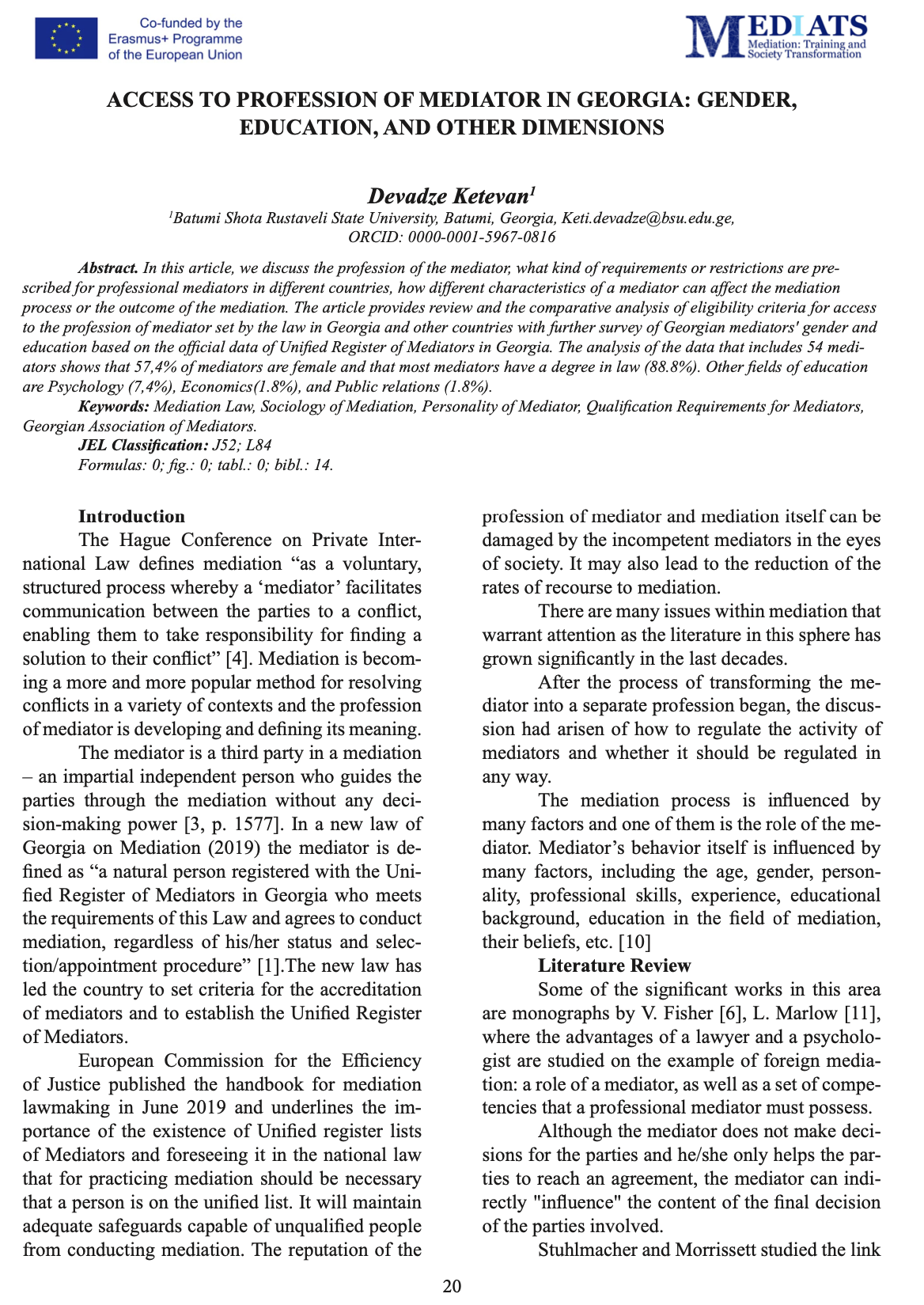ACCESS TO PROFESSION OF MEDIATOR IN GEORGIA: GENDER, EDUCATION, AND OTHER DIMENSIONS
Keywords:
Mediation Law, Sociology of Mediation, Personality of Mediator, Qualification Requirements for Mediators, Georgian Association of Mediators.Abstract
In this article, we discuss the profession of the mediator, what kind of requirements or restrictions are pre- scribed for professional mediators in different countries, how different characteristics of a mediator can affect the mediation process or the outcome of the mediation. The article provides review and the comparative analysis of eligibility criteria for access to the profession of mediator set by the law in Georgia and other countries with further survey of Georgian mediators' gender and education based on the official data of Unified Register of Mediators in Georgia. The analysis of the data that includes 54 medi- ators shows that 57,4% of mediators are female and that most mediators have a degree in law (88.8%). Other fields of education are Psychology (7,4%), Economics(1.8%), and Public relations (1.8%).
References
Law of Georgia on Mediation, N4954- Is, (2019).
Unified Register of Mediators’ URL: https://mediators.ge/en/mediators/all/worldwide/all/all/0/1/
The Federal Republic of Germany, Mediation Act. Bundesgesetzblatt I, p. 1577, Sec. 1 (2). 2012.
The Hague Conference on Private International Law, Guide to Good Practice under the Hague Convention of 25 October
on the Civil Aspects of International Child Abduction (2012)
Court-Certified Mediator Qualification Requirements in the USA, URL: https://legalstudiesms.com/learning/court-certi- fied-mediator-qualification-requirements/
Fisher, R. J., & Keashly, L. (1991). The Potential Complementarity of Mediation and Consultation within a Contingency Model of Third Party Intervention. Journal of Peace Research, 28(1), 29–42.
Stuhlmacher. A., Morrissett. M. (2008). Men and women as mediators: Disputant perceptions. International Journal of Conflict Management. 19. 249-261.10.1108/10444060810875804.
Tokarz, K., (2020). Pioneering Women Lawyers Who Changed the Legal Profession and Influenced the Practice of Law, Including Mediation Practice: From Barkeloo and Couzins to the Present, Washington University Journal of Law & Policy, 62, 15-23.
Marlow. L., Saube. S.R., (2013). The Handbook of Divorce Mediation
Nolan-Haley, J. (2002). Lawyers, Non-Lawyers and Mediation: Rethinking the Professional Monopoly from a Prob-
lem-Solving Perspective. Harvard Negotiation Law Review, 235(7), 235-99.
Jones. G., Pexton P., (2015). ADR and Trusts: An International Guide to Arbitration and Mediation of Trust Disputes, Spiramus Press ltd Kandashvili, I., (2018). Mediation and Online Dispute Resolution (ODR)
Mediation as an Innovative Form of Dispute Resolution. TSU Journal of Law.
Korybski. A., (2018). Legal Status of Mediator in Mediation Proceedings in Civil Cases. Studia Iuridica Lublinensia, 143- 162
Leonard L. Riskin, Richard C. Reuben, Jennifer K. Robbennolt, Nancy A. Wels, Art Hinshaw & Alyson Carrell (2019). Dispute Resolution and Lawyers, P. 361





